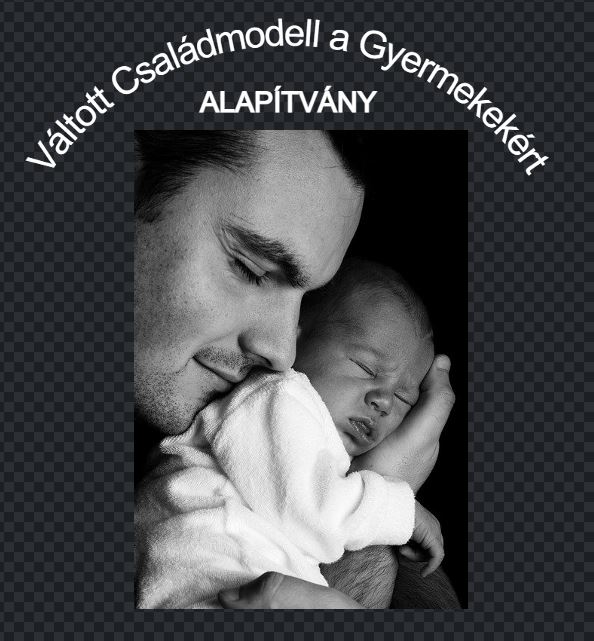The Switched Family Model Public Foundation is a non-profit organization. By our Deed of establishment, our goal is the switched family model as a legal obligation introduction as a standard procedure into the European and Hungarian legal systems. Our priority is in matters of child protection and child placement following divorce, supporting the rights of persons holding paternal and maternal status.

Switched Family Model Public Foundation
Our endeavor
Our unique endeavor is to realize equal rights related to child placement and ensure them during decision-making, regardless of gender.

The Switched Family Model Foundation fights for the equal right to place children without time or financial interest.
We stand for the prioritization and mandatory application of the model, if the child's parents cannot agree on the issue of child placement based on the place of residence or possibly another family model.
We consider unilateral child placement to be an outdated model that tramples on the human rights of the child and the child's parents and grandparents, and causes hidden and obvious costs and unbearable suffering for society. We believe that child care should be won by the children, not by the victims.

Our core values
We condemn all unjustified and unequal child placement decisions. We believe that a child needs both a mother and a father. If the parents who are both suitable for the role of mother and father cannot agree on joint custody, then the visit should be fair and equal!
Decision No. 2079(2015) of the European Council requires this for the member states. As long as this decision is directly ignored by most EU member states, it represents a lack of rule of law and a disregard for human rights.

We condemn...
- We condemn any verbal deprivation of custody rights; we only undertake joint parental supervision.
- We condemn child support demanded from parents who were legally and unjustifiably deprived of their children.
- We condemn behavior that obstructs visibility and the lack of consequences.
- We condemn the reckless expert opinion in legal proceedings that contradicts the above, takes into account only one party's viewpoints.
- We condemn the dependence of the Switched Family Model application on the consent and willingness of both parents to cooperate. In our opinion, in cases where the parents cannot or do not want to cooperate or agree on the issue of child placement, this alternative family model that takes the interests of the child into account must be preferred. We consider the protection of the child's rights and interests more important than the parents' inability to reach an agreement. In such situations, the decision of the parents must be forced by the children by force of law. The parent who fails to agree must be sanctioned (e.g., by transferring full custody to the other parent) until the willingness to cooperate is demonstrated.
- We condemn the imprudent opinion of experts in legal proceedings that contradicts the above and only take into account the aspects of one party.
What we refuse
What we are fighting for
We are fighting for the creation of a legal standard applying the switched family model by law in the case of equal conditions of parental suitability.
What we see
In the current legal situation, which we consider cynical, or in the legal application, the parent unwilling to cooperate is rewarded (most often the mother, even if the father's role is prominent in the child's life), and is awarded sole custody of the child, together with child support.
We consider deviations from the switched family model only to be applicable in the following exceptional cases
- one parent voluntarily renounces participation in the switched family model in favour of the other parent or the parents voluntarily agree on another alternative model;
- one (or both) parents are unfit to raise children (criminality, addiction, etc.);
- if the conditions listed in point 2 of principle 20 of the European Family Law Commission are not met (the ability of the parent to cooperate exclusively, as this could be enforced by law to protect the interests of the child, the so-called Swedish model).
Be a reachable Father!
Many fathers rarely see their children after divorce, while some lose their relationship with them altogether.
How many children are affected by this? The article below is based on data from the Generations and Gender Survey.
How many children are affected by this? The article below is based on data from the Generations and Gender Survey.
As economic instability increases, the risk and disadvantages of divorce increase for the children too. In case of a divorce, parental custody is divided between the father and the mother. However, in 7 out of 10 points, the parent with primary custody is the mother.
She is entitled to spend most of her time with her child(ren) taking care of them unless this is prevented by a serious contraindication. Consequently, after a divorce, many great fathers find it challenging to fulfil their parenting role. Unfortunately, it is still not a common practice for a child to stay with the father after a divorce, even if the father has previously proven that he performs excellently both in the role of caregiver and parent.
Considering the number of single-parent families, it would be very important and urgent to take into account how children are affected by the father’s absence, and what effects this has during childhood, adolescence and after reaching adulthood.
Several studies have already shown that the continuous relationship with the father after divorce has a beneficial effect on the social, cognitive and emotional development of children. Despite this, separated fathers often lose contact with their children. According to the ERFI survey*, almost every fifth child of divorced parents will never see their father. (*The ERFI survey was conducted by INED and INSEE in 2005 on a group of 10,079 men and women aged 18–79.)
In families where the parents are together, children start to leave the parental home at 18: they study or establish their own home but remain in close contact with their parents, and the proportion of those who never see one of the parents is negligible.
However, if the parents live separately, the frequency of paternal and maternal contact differs greatly. Apart from a few rare exceptions, contact with separated mothers is maintained beyond 18, living with the father is much rarer, and its proportions are overestimated.
Fathers living apart from their children will never be seen by 8% of children aged 0–4. It also occurs as rarely as possible in the case of children under the age of 6–18. In 18% of children aged 0–34 of separated parents, the father never even meets them.
According to the mothers, 98% of children aged 0–4 live with their mothers after the divorce, while according to the fathers, this is barely 26%. This is over 100%. This is partly due to changing or limited residence, where both parents still live with the child but are only with them occasionally.
The parent with primary custody until the child’s 18th birthday is required by law to ensure access to the other parent. After reaching the age of majority, the child cannot be legally required to see the father or the father to see his children. Many children over 18 no longer wish to maintain a relationship with their father, and in some cases, the father also believes that his role as a parent ends at this age. That’s why he doesn’t make any further efforts to keep in touch. 14% of the children do not meet their father who lives alone. If they live with a partner, it is 24%. Although these results show a clear correlation, they do not distinguish between cause and effect. When the father finds a new partner, the child may no longer want to see him, or the father loses interest in the child.
It also often happens that the mother tries to prevent the father from having contact with his child, so the loss of relationship with the child encourages the father to start a new life elsewhere.
The distance between the parent’s and the child’s home is also a central factor: the greater the distance, the less frequent the contact. A 4-hour journey from one home will strongly affect the frequency of meetings. Above 4 hours of travel time, the rate increases to 33%. When the father reports that he does not know much about the travel time to his child’s home, this rate reaches 81%, indicating a complete loss of contact. (INED-INSEE, ERFI- GGS (1), 2005.)
The father’s education, employment status and income also influence the likelihood that the child will not have contact with him. The lower their education and the more unstable their employment situation, the more likely they lose their relationship with their child. A high income makes it easier to pay for travel expenses for visits and to buy an apartment big enough to accommodate the child(ren) when they are there.
The father’s relationship with his children is also strongly influenced by his family history. The proportion of children who no longer see their father is twice as large if the father himself was not raised by two parents until the age of 15. Loss of contact is also much more common if the father of the child(ren) never even saw his father.
Finally, it should be noted that the lack of father-child contact does not depend on the gender of the child, but in cases where children live with their fathers, this is more often true for boys. In most cases, custody is given to the mother for various reasons. Although this option may be a choice preferred by both parents, or it may arise from the practical difficulties of establishing a changing place of residence, mostly hinders the father from carrying out his regular duties as a parent, and clearly makes it difficult to maintain the father-child relationships.
This and the manner of the divorce most significantly affect the frequency of father-child contact. The proportion of children who never see their father is very high if the divorce is not by mutual agreement and it was initiated by the mother or the father. Ties are broken much more often if the child(ren) lived only with their mother in the year following the divorce. This rate is 21%.
As opposed to the rare cases where the father has custody. In this case, the rate is 12%, and it drops to only 1% if the children live alternately with their two parents! The solution can be seen more in the case of separation based on mutual agreement.
The article deals with those fathers and applies only to those who deserve to be able to raise their children even after divorcing their mother. It does not include fathers who have lost custody for reasons that arguably harmed the safe upbringing of children.
Laws already provide an opportunity to agree on a switched family model. Laws already provide an opportunity to agree on a switched family model, but legislative practice rarely takes these rights into account. Let’s think about something else besides the above. Let’s also take into account the feelings associated with the loss of paternal grandparent roles, which you can read in an article linked.
It’s time to improve the situation of those children whose parents are or were divorced due to the cooling of love, and after the divorce, the hurt of the mother’s side does not allow them to meet their father and for the father to continue to be a part of their children’s lives.
(Andrea Béres — a member of the board of trustees of the Switch Family Model- https://vcsmalapitvany.hu/English_page.html. On the same page, I would also like to recommend the article entitled …and who thinks about the Grandparents?)
FATHERHOOD...MORE IMPORTANT THAN WE THINK
"When you are with your child, the greatest gift you can give a child is your attention."
UNICEF Goodwill Ambassador David Beckham shares his experiences as a father and his favorite moments with his children.
We are fathers and we are men
Father: I try to participate as much as possible in my son's life. I prepare his bottle, bathe him, change his diaper. I want to be present in everything in my child's life."
Apa: Igyekszem jó apa lenni. Próbálom minden nap. Nem mondhatom hogy: "Ma nincs kedvem játszani." Ez nem opció.
...and who thinks of the grandparents?

When a lack of parental communication develops due to the breakup of a marriage, it is common for the parent who was awarded custody not to allow grandparent visits involving the other party either. Has such a restrictive parent ever considered how difficult it can be for grandparents to separate themselves from the joy that comes from being with their grandchildren?
It's like losing the future. The joy and excitement planned together with the grandchildren is completely lost. They have to endure a lot of sadness, anger, hurt, heartache, isolation and loneliness. This situation occurs when grandparents are banned from their grandchildren and are not allowed to see them or have any contact with them.
During a divorce and limiting the child's visibility, who thinks of the grandparents? Separation from grandchildren can lead to physical, mental and emotional alienation of grandparents.
When the grandparent-grandchild relationship doesn't work, it can create a sense of total loss in a grandparent's life. According to experts, this state is similar to the experience of grief.
There are still few recent data available on how many grandparents have only routine or no contact with their grandchildren because of such restrictions, but you can read a lot about the importance of the grandchild-grandparent relationship!
It is good if we are aware that the close relationship between grandchild and grandparent helps to eliminate depression symptoms, and the close relationship also has a positive effect on the well-being of adolescents.
A good relationship between them helps children to get along better with others and also strengthens the development of their self-management skills. If the father was a caring and beloved person in the child's life, who is it worth putting so much pain and loss on the child and the loving grandparents due to the broken relationship with the other party?
(Andrea Béres - a member of the board of foundation trustees)